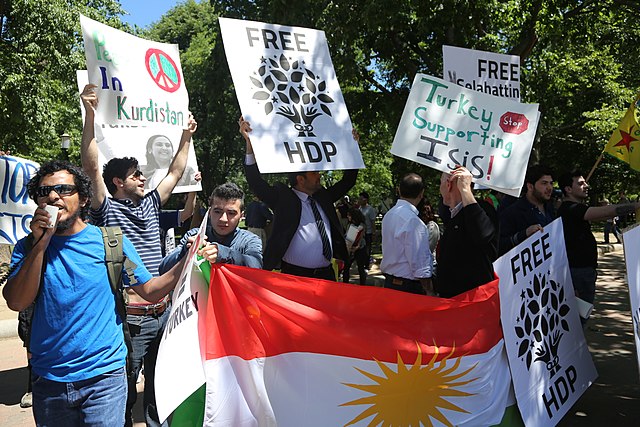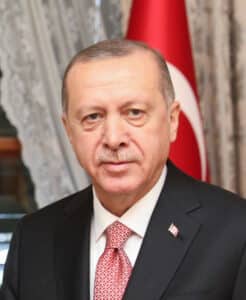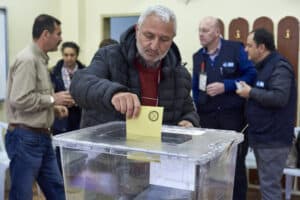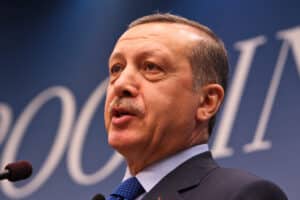Photo: Anti-Erdogan protest during his visit to the White House in 2017 – Wikimedia Commons
The raids on twenty Kurdish targets in northern Iraq by Türkiye last week, mark a common practice of retaliation after regular attacks on Turkish targets conducted by the Kurdish PKK (Kurdistan Workers’ Party). Last Sunday a suicide bombing in front of the Ministry of Interior shook up the capital of Ankara, wounding two police officers. The responsibility for the attack was later claimed by the PKK. The PKK – designated a “terrorist” group by Türkiye, the EU and US – has been fighting the Turkish state since 1984. Kurds execute terrorist attacks in Türkiye to demand recognition for their struggle – the Kurdish people wish to create an independent state called Kurdistan. This includes territory in southeast Türkiye as well. Türkiye not only condemns these attacks with retaliating actions, killing dozens of Kurdish people on the way, it is also keen on launching anti-Kurdish campaigns after every attack. Erdogan’s AKP often transforms the military tensions into political ones. It portrays a battle against not only the PKK but it accuses the pro-Kurdish People’s Democratic Party (HDP) of having direct links to the PKK, implying that Kurdish political parties are responsible for the terrorist attacks too. By creating the narrative that all Kurds are affiliated with terrorism, Türkiye tries to delegitimise Kurdish politics and authorities as a whole.
The struggle for Kurdistan
The Kurds are one of the most well known ‘people without a state’. They live scattered in the mountainous border region of Türkiye, Syria, Iraq and Iran. Kurdish fighters seek more autonomy and eventually independence. The PKK carries out attacks on military targets as well as civilians to gain attention for their political and cultural struggle of being oppressed. Turkish forces in turn launch military operations in the southeast of the country trying to force the PKK out. The conflict between Türkiye and the PKK has already killed more than 40.000 people over the years.
The Turkish-Kurdish divide
Erdogan’s stance on the Kurdish matter has hardened during his presidency. In his early years, Erdogan expanded political and cultural rights for Kurds living in Türkiye. He even participated in a peace process with the PKK in an attempt to lay down weapons. The ceasefire ended in 2015 after two years, following a suspected ISIS suicide bombing killing thirty Kurds. Since then, Türkiye has increased military action against the PKK, referring to the self-defence rights described in Article 51 of the UN Charter. Turkish armed forces have in recent years conducted several large-scale military operations in northern Iraq and Syria against Kurdish militants. It sticks to its strategy of a 30 km “security strip” along its border with Iraq and Syria. This ‘strip’ borders into Iraq and Syria and violates their territorial integrity. Türkiye has established military bases in these territories from which attacks against Kurdish targets are planned.
Anti-Kurdish campaigns
The Turkish AKP downplays Kurdish authorities by simply calling everyone terrorists. Erdogan uses terrorist attacks conducted by the PKK to delegitimise the HDP – surely an organisation with links to terrorism should not be able to conduct politics. The HDP is said to be the ‘political arm’ of the PKK, but these affiliations are refuted by both. Moreover, the HDP has structurally opposed democratic backsliding practices under Erdogan’s governments. The rhetoric of Erdogan feeds into hate crimes by ultra-nationalists against Kurds, like attacks on HDP offices. Kurdish politicians, activists, lawyers and students are detained on a regular basis. The Constitutional Court has even put the HDP on trial over alleged links to the PKK. Western powers express their worries as a ban on the HDP “would violate the rights of millions of voters in Türkiye”. In the aftermath of the Ankara attack, over 90 people were detained across the country based on suspected links to the PKK. Among them were members of the HDP. Turkish nationalism under Erdogan has risen steadily and explains the Kurdish matter as an issue to be dealt with firmly. The fear of a new state called Kurdistan which would take parts of Turkish territory, is enough to scare the Turkish population and legitimise military operations against Kurds, within Türkiye as well as past the border into neighbouring countries.
Not only are Kurds attacked ‘at home’, but also abroad in the sense of the Kurdish diaspora. During Finland’s and Sweden’s NATO bids, Erdogan took the opportunity to demand the countries to adopt a tougher stance against the Kurdish diaspora in exchange for agreeing to their NATO accession. Kurdish ‘terrorists’ were extradited and anti-terrorism laws were strengthened.
Although condemnation of terrorism is always justified, it remains important to separate renowned political actors from the terrorist organisations that conduct terrible crimes, such as the recent attacks in Ankara. A tough stance and attempted delegitimization of all Kurdish forces does not help reconciliation and only feeds into more hostilities. Political parties should not be excluded on the basis of ethnicity and false allegations of terrorism. Without opposition parties and representation of all people, it is impossible to maintain a healthy democracy.
Written by Timon Driessen



